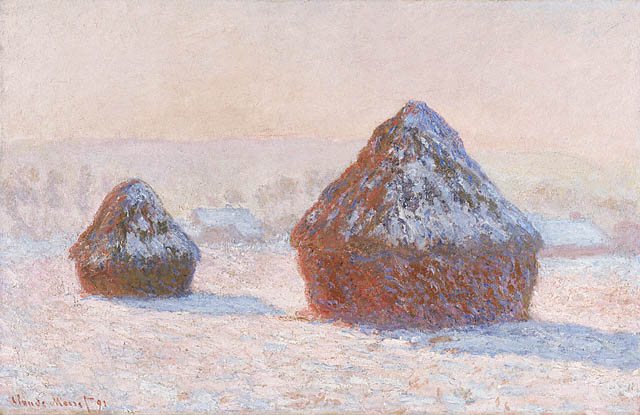【War Archives】
2025-06-25 21:18:24
386 views
696 comments
A Generic Statement About Haystacks,War Archives and Other News
On the Shelf

Claude Monet, Wheatstacks, Snow Effect, Morning, 1891.
- Our new Winter issue, hot off the presses, features poems from A New English Grammarby Jeff Dolven. One of them, “*The Haystack’s Painting,” has occasioned a roiling linguistic-grammatical debate at Language Log. “I would have no problem with a sentence such as ‘We sat in the haystack’s shadow’ in any case, but the case at hand is not a generic statement about haystacks,” one reader writes: “The body of the poem personifies the haystack, so it seems perfectly consistent that the title does also. If the reader is caught short by the title, only to have the tension relaxed by personification in the following lines, this is to the poet’s credit.” Another says, “I’m not quite sure what’s being considered ungrammatical about ‘The haystack’s painting.’ Haystack is a noun; nouns have possessive forms. It’s certainly unusual to consider the subject of a painting to be the ‘owner’ of that painting, but I think it’s quite an effective poetic device here.”
- The poet Stephen Spender kept his sexuality a secret—a burden he managed only with the belief that leading a double life was completely ordinary for a writer. “In the 1990s, when literary parties were more fun, or I was more fun, I used occasionally to see Stephen Spender,” Andrew O’Hagan writes: “there he was, the establishment on quivering legs, queer as a chocolate orange but safely married. (When I spoke to him, I discovered he could flirt with his eyes shut.) … ‘Just do your thing,’ one wishes to say to him, but he was doing his thing, and part of that thing was not really to know what his thing was. Sexual identity gets all the limelight, but sex itself wasn’t particularly important to Spender and the freedom he harped on about, and feared losing as a result of his domestic decisions, was the freedom to write as he wanted to.”
- Today in length: books have more of it than ever. A survey found that the average number of pages in a book has increased by 25 percent since 1999—to four hundred pages. “The real struggle is publishing an unremarkably-sized book,” one agent says: “the most difficult area now appears to be the middle. Mid-list, mid-career, middle-sized—in fact anything that’s middling.”
- Jewels, vases, statues, masks, vessels … you name it, the Ancient Greeks had it in gold. And now this plunder is ours, all ours: “We learn a great deal about Greek art by being grave robbers. The immensely privileged eased themselves into the afterlife with much of the booty that had cushioned their time on earth. It seems they aimed at taking along enough symbols of power and wealth to get whatever passes for honor in the underworld. Greek and Roman rulers and victors wore wreaths more often than crowns; so we find gold imitations of the rich foliation of crowns made from different tree branches. Phillip II was buried in an underground miniature temple wearing an oak leaf wreath made with stunning realism by his little army of goldsmiths.”
- People have been flying in the movies for more or less as long as they’ve been flying in real life. The plane, in cinema, has long functioned as an essential piece of visual vocabulary, and also as propaganda. During World War II, the military commissioned directors like William Wyler to bring a glorious variant aerial combat into movie houses: “Wyler and his crew embedded (as we might now say) with the 91st Bomb Group. They took their sixteen-millimeter cameras on bombing runs … The results of his time with the 91st Bomb Group were assembled into a short documentary called Memphis Belle(1944), which James Agee praised for its immediacy. ‘I could not guess which shots were re-enacted and which were straight records,’ Agee confessed, and postwar movies would often aspire to induce precisely this confusion. Agee had an ethical commitment to documentary, and a temperamental suspicion of artifice, and during the war his insistence on the literal, visceral truth reflected the biases of the filmmakers themselves, who often battled Army censors over how much unvarnished reality they could show.”
Search
Categories
Latest Posts
Imperfect Voices
2025-06-25 21:14“An American in Paris” Leaps from Screen to Stage
2025-06-25 20:02A Letter from Ernest Hemingway: “Liquor is my best friend”
2025-06-25 19:13Steve DiBenedetto’s Cave Paintings for the Future
2025-06-25 18:59How 3D Game Rendering Works: Lighting and Shadows
2025-06-25 18:38Popular Posts
Burning Down the Bordertown
2025-06-25 21:14Notes on Wackiness
2025-06-25 20:38The Picasso of ... Whatever
2025-06-25 20:36Punks Behind the Iron Curtain
2025-06-25 20:16India Walton’s Uphill Battle
2025-06-25 19:32Featured Posts
The Global Garage
2025-06-25 21:01Can People Write from the Perspective of Animals?
2025-06-25 20:55World Dream in Six Words
2025-06-25 20:37The Forest of Letters: An Interview with Valerie Miles
2025-06-25 20:14Unfocused Feminism
2025-06-25 19:05Popular Articles
The Dark Side of the Jazz Age
2025-06-25 20:26Macaroon vs. Macaron: Cookie Summit 2015
2025-06-25 20:01“An American in Paris” Leaps from Screen to Stage
2025-06-25 19:50Nabokov Knew How to Hate a Party
2025-06-25 19:49For God or the Moroccan Boy?
2025-06-25 19:39Newsletter
Subscribe to our newsletter for the latest updates.
Comments (1654)
Habit Information Network
The Sounds of Internment
2025-06-25 20:02Heat Information Network
Dan McPharlin’s Visions of Past Futures
2025-06-25 20:02Charm Information Network
Feminist Fumes: Anicka Yi’s Miasmatic Art
2025-06-25 19:51Warmth Information Network
Wordsworth’s Most Famous Poem Turns 200
2025-06-25 18:52Steady Information Network
Real Magic
2025-06-25 18:38